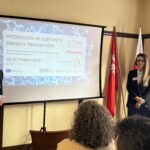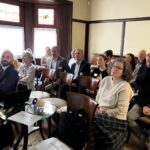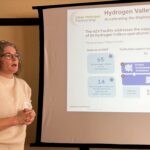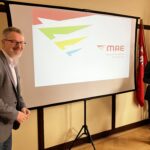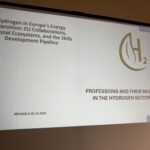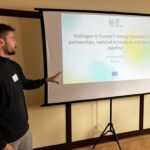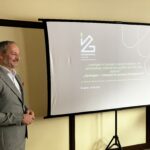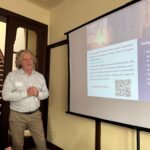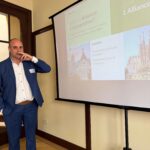Brussels, 28 October 2025 — ECRN, in collaboration with the Erasmus+ project “Professionals and their Skills in Hydrogen” and Mazovia, hosted a focused half-day dissemination event that links the European policy and partnership landscape to Belgium’s and Poland’s national ecosystem. The event set out why hydrogen matters for Europe’s energy transition, explained how EU partnerships operate and interface with regions, and showcase the skills needed to build a capable workforce. The event has been moderated by the Director of Mazovia Region Representative Office in Brussels, Ms Nina Małachowska. Introductory remarks were given by ECRN Executive Director, Folco Ciulli.
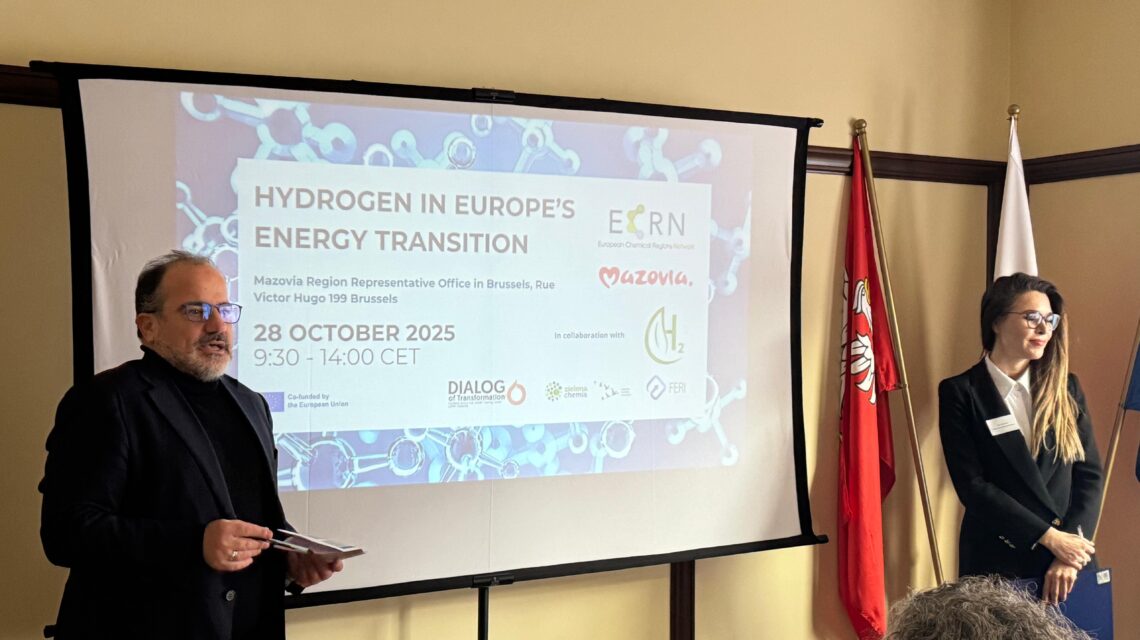
Hydrogen Valleys: The European Framework for Regional Leadership
Opening the discussions, Inês Moura Martins of the Clean Hydrogen Partnership presented the EU’s approach to building integrated Hydrogen Valleys — regional-scale projects that demonstrate the full hydrogen value chain, from production and storage to distribution and use.
With 21 Hydrogen Valleys already funded and an ambition to reach 50 by 2030, the Partnership’s €1.2 billion research and innovation programme under Horizon Europe is supporting regions in transforming hydrogen strategies into tangible projects.
She also introduced the Hydrogen Valleys Facility, which provides Project Development Assistance (PDA) to help local consortia prepare bankable projects, and the new STEP Seal, designed to bridge EU-level and regional funding.
“Regions are the places where Europe’s hydrogen transition becomes tangible,” Moula Martins underlined. “They connect local industry, research, and citizens around concrete energy and mobility solutions.”
Mazovia and Poland: Building a Hydrogen Economy from the Ground Up
Piotr Popik, Expert of the Mazovia Energy Agency, presented how the Mazovia Region is translating national and European strategies into regional practice. Poland’s 2024 “Constitution for Hydrogen” created a legal framework defining hydrogen production and use, paving the way for investment and standardisation.
Mazovia’s flagship initiative, the HySpark Hydrogen Valley, aims to decarbonise Warsaw Chopin Airport and surrounding transport systems. Other projects, such as the “Wodorowy Płock” project (27 hydrogen buses using Orlen-produced fuel), demonstrate practical integration between local government, industry, and EU funding mechanisms.
“For regional governments, hydrogen is both an environmental and an economic opportunity,” Popik explained. “We are building ecosystems where local energy systems and industry evolve together.”
Belgium: Connecting Hydrogen Production, Imports, and Infrastructure
Isabelle François, Project Manager of WaterstofNet and representative of the Belgian Hydrogen Council, presented Belgium’s multi-level approach to hydrogen deployment.
While the federal level focuses on import and logistics — including ammonia terminals at Antwerp-Bruges and the Hydrogen Backbone pipeline network (operated by Fluxys) — the regional level drives innovation, pilot projects, and industrial applications.
Projects such as Hyoffwind (25 MW electrolyser in Zeebrugge) and Hydrogen Valley Flhyports illustrate how cooperation between local industry and research creates scalable business models.
“Hydrogen cannot be developed in isolation,” François stressed. “Regional and cross-border cooperation are essential to reach European scale.”
Research and Innovation: Hydrogen in Chemistry and New Applications
Adding a research and innovation perspective, Arkadiusz Majoch, Director of the Sustainable Chemistry Centre at the Łukasiewicz Institute, underlined the growing importance of hydrogen in the chemical sector.He presented national R&D initiatives focused on:
-
The use of hydrogen in sustainable chemistry and industrial processes;
-
The integration of hydrogen in biomass conversion and green feedstock production;
-
Pilot projects for hydrogen-based chemical synthesis within the Łukasiewicz research network.
Dr. Majoch also noted the need for closer cooperation between science and business, emphasising the value of regional and European platforms like ECRN in connecting research with industrial deployment.
“Hydrogen technologies are redefining chemistry itself,” he said. “Our institutes must help industry translate innovation into viable, competitive solutions.”
Skills for the Hydrogen Transition: Education as an Industrial Strategy
The session on skills brought together perspectives from academia, European associations, and regional clusters, highlighting that human capital is now one of the decisive factors in the hydrogen economy.
Dominik Richter – Hydrogen Europe Research
Representing the Hydrogen Europe Research Association, Dominik Richter presented current EU actions to map emerging skills gaps and coordinate the creation of a Hydrogen Academy.
He described cooperation between universities, vocational schools, and research institutes to design modular training frameworks under Erasmus+ and Horizon Europe.
“We are not only building infrastructure, but also careers. The hydrogen sector needs engineers, technicians, chemists, economists, and policy experts working together.”
Ignasi Salvadó – OPERA, 4Allianza Universidades
Ignasi Salvadó, Director of the Office for the Promotion of European Research Activities (OPERA) and representative of the 4Allianza Universidades consortium, stressed the importance of cross-border academic collaboration in hydrogen education.
He highlighted the creation of European university alliances and joint curricula that enable students to specialise in hydrogen technologies while gaining international experience.
“We must educate for a European hydrogen market, not just national ones,” he noted. “Our universities are aligning programmes to the same skills framework.”
Prof. Patrick Hendrick – Université Libre de Bruxelles (ULB)
From the academic perspective, Prof. Patrick Hendrick presented ULB’s postgraduate programme “Hydrogen Applications and Technologies”.
This multidisciplinary course covers electrolysis, fuel cells, storage, safety, regulation, and system integration — combining classroom learning with visits to industrial sites such as Toyota, Engie, and Cummins.
“We train professionals who understand hydrogen not just as a technology, but as part of an integrated system — technical, legal, and economic,” Hendrick explained.
Przemysław Wojdyła – West Pomeranian Chemical Cluster “Green Chemistry”
Przemysław Wojdyła, Vice President of the West Pomeranian Chemical Cluster “Green Chemistry”, presented the results of the Erasmus+ project “Professionals and their Skills in Hydrogen”, which surveyed and defined the key competencies required for the emerging hydrogen sector in Poland and across Europe.
The study identified priority skill areas such as:
-
Electrolyser operation and maintenance;
-
Hydrogen safety and certification;
-
Infrastructure design and system integration;
-
Hydrogen-related chemistry and materials science.
The findings will serve as a basis for curriculum design in vocational schools, technical universities, and lifelong learning programmes.
“We need to move from awareness to training — from projects to people,” Wojdyła concluded.
Please find the presentations:



